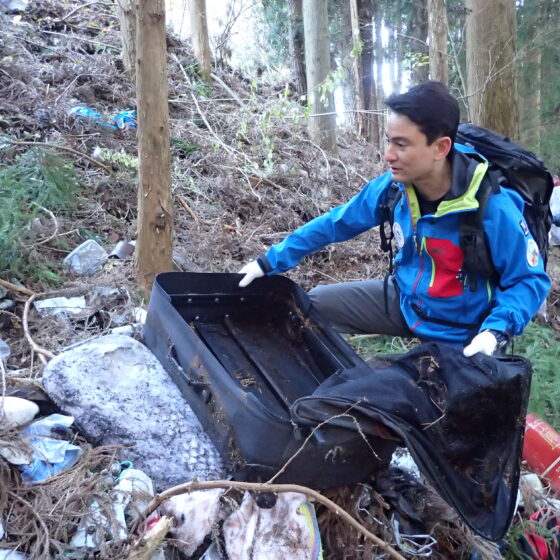- The first time I became aware of environmental issues was in 1997, when I made my first attempt to climb Mount Everest. Mountaineering teams typically spend a period of one to three months on a mountain, and back then, leaving behind all your food-related waste and spent oxygen tanks was the norm. However, base camps are usually situated on glaciers, where bacteria capable of breaking down trash don’t exist. When you go on mountain cleanup missions, you find trash left over from climbing expeditions that were there fifty years ago. To be honest, back then I wasn’t concerned about the trash situation despite climbing the world’s mountains countless times. That particular year however, numerous climbers from all over the world told me “You Japanese leave so much trash behind.” True, there was a lot of food packaging with Japanese text lying around, but those words left me feeling so frustrated. They made a lasting impression.
- In 1999, I finally succeeded in reaching the summit of Mount Everest in my third attempt, and when asked what my next goal was, I vowed to climb the Everest on a cleanup mission. Nobody had ever been on an expedition where the aim was not to reach the summit, but to clean the route leading up to it. At first, the Nepalese sherpas supporting us refused, saying that cleaning up garbage was a job typically done by those belonging to lower castes. However, after some persuasion, and by showing them that I as team leader was also going to pick up trash myself, they gradually understood and soon began to engage in the mission with enthusiasm. Now, thanks to the sherpas who are cleaning up the mountains with regularity, trash is rarely spotted at the base camps.
- Another thing that made me happy was the positive impact it had on the sherpa’s hometowns. Since the cleanup mission, the sherpas began noticing all of the litter lying around their own villages, and took it upon themselves to clean them up by creating trash disposal sites and finding ways to separate cans and plastic.

ENGLISH CONTENTS

2023.02.10
ENGLISH CONTENTS
SPECIAL INTERVIEW "Ken Noguchi"
mountaineer “Having a connection to nature leads to a heightened interest in environmental issues.”①
- TEXT
- Yukiko Ushimaru
- PHOTO
- Yoshiaki Tsutsui
- Share
-
STAY
-
KAWASAKI KING SKYFRONT TOKYU REI HOTEL
-
〒210-08213-25-11, Tonomachi, Kawasaki-ku, Kawasaki-shi, KanagawaTEL.+81-44-280-1090FAX.+81-44-266-1093








